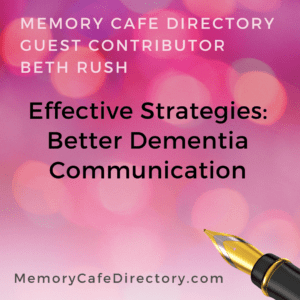Memory Cafe Directory posts and/or links to retailers can be advertising, sponsored, or affiliate links. We may earn a small commission from them. Thank you.
Communication is essential for people with dementia since it’s how they stay socially active. However, their ability to communicate eventually wanes and the challenges of communication multiply. Care partners must adapt to the decline in these skills so they can talk with their loved ones beyond words.
The following tips are 10 effective communication strategies for someone with dementia.
1 Introduce Yourself
Memory loss worsens as dementia progresses. If your loved one can no longer recognize you because their memory is on an earlier timeline in their life, always introduce yourself before striking up a conversation.
Approach them from the front so they can see your face. Say your name but exclude telling them you’re their daughter or relative to avoid more confusion. If they don’t recognize you’re a family member, settle with just providing your name.
2 Use Simple Words and Simple Sentences
The person’s ability to process information declines, so choose simple words when chatting with a loved one. This is even more important in the later stages of dementia.
Instead of introducing two or three different ideas in one sentence, break it down for better comprehension. You can say, “We have a doctor’s checkup tomorrow at 10 a.m. We need to get up at 9 a.m.”
Use short sentences and be straightforward. Dementia is a progressive disease and it takes more and more effort for the deteriorating brain to digest information as time goes on.
3 Remove Distractions
The ability to focus also deteriorates as dementia reaches the severe stage. Find a quiet and comfortable place without excessive background noise that lets your loved one participate in conversations with full attention.
The physical environment is important. Outdoor public areas are not conducive for focused discussions, so it’s best to talk at home. A bedroom is a good place for a one-on-one conversation. Close the door, turn off the TV or any noise source, and keep the phone away. It’s easier to exchange ideas if the environment is conducive.
This is especially true if there is a language difference. I your first language is not their first language, distractions can also include accents.
4 Set the Best Time To Talk
Seniors with dementia experience mood swings and behavioral symptoms throughout the day. Bad days can happen at any time. They may be aggressive one minute and then get lost in a train of thought the next.
They may also exhibit sundowning, accompanied by feelings of restlessness, agitation and confusion from late afternoon until evening.
The first step is to be aware of and identify the good days when your loved one is the most alert and calm to facilitate conversations. People with Alzheimer’s disease or other forms of dementia usually function better in the mornings, according to the Alzheimer’s Association. This is the perfect time to sit down for a talk or schedule activities.
5 Use a Loving Tone
Your tone of voice can massively impact the outcome of your dialogues. Keep it positive and friendly but still respectful and affectionate. Never resort to using baby talk, such as calling them “dear” or using a high pitch sing-song tone, as it is disrespectful. A friendly voice is always welcomed and will always help to garner a person’s attention.
Use adult language if you must repeat instructions. It also helps to talk to them when you’re seated instead of standing, which can be intimidating to older people.
6 Stick to One Topic at a Time
Loved ones are likely unable to juggle various ideas mentally if memory loss is severe. Talk about one topic at a time so they join the discussions and participate in social activities.
For example, if you show them an old photo of their travels, you could say, “The city looks amazing at night. What do you think?” It keeps the conversation focused on the view instead of other things, like the people or food.
For a successful communication about the photo, give the plenty of time to enjoy it, allow them to grasp the key words of what you asked, and then allow them to respond in their own way.
7 Understand Non-verbal Communication
People lose their communication skills in the late stage of the disease, so your loved one will likely be unable to express themselves using words. In this case, you’ll need to learn to use nonverbal cues like gestures, eye contact, facial expressions and gentle touch.
Your facial expressions can show you’re happy to meet them. A thumbs up or a nod can mean you’re OK or agree with something and shaking your head means you don’t. A warm bear hug means you care for them. If you have trouble communicating, body language can help you have a meaningful conversation, even without words.
8 Allow Time to Respond
Dementia patients will find it challenging to support the conversation as it goes on with their declined mental ability. They may need to pause for a few minutes before they can answer your question. Give them ample time to think and find the right word to use. You may need to repeat or rephrase your question before they can grasp what you’re asking.
Suggest hints if they struggle to think of the appropriate term and ask them to acknowledge if they understand your point. For example, you can say, “We have a doctor’s appointment tomorrow, OK?”
9 Support With Visual Aids
One study reported that visual support can promote comprehension and decision-making for people with brain impairment. You can make communication easier at home by using visual cues.
For example, you can paint the bathroom red to distinguish it from the bedroom. You may also stick large pictures of cups, utensils and cleaning products on each kitchen cabinet to identify their contents.
Using visual aids at home gives them convenient access to things and goes a long way toward improving their quality of life.
10 Avoid Open-Ended Questions
Rather than requesting an explanation, ask questions answerable by a yes or no or provide an option. It reduces confusion and helps them respond promptly.
“Do you want to read a book or go for a walk?” is better than asking, “What do you like to do today?” The first question offers two simple options from which they can select, which is less confusing. The second question has several answers they need to think of, which can overwhelm the brain.
Meaningful Conversations Are Possible With Dementia
People assume having a meaningful conversation with a loved one with severe cognitive impairment is impossible — but it’s not. Dementia is a progressive illness, so they eventually lose their speech ability. However, you can use nonverbal communication techniques to help convey a concept.
Fortunately, communication strategies for dementia aren’t limited to spoken or written words. These 10 communication tips can help you facilitate discussions and help your loved one stay socially active.
About the Author
Beth Rush

Beth Rush
Beth Rush is the Managing Editor and Content Manager at Body+Mind.
Body+Mind features articles about diet, fitness, mental health, parenting and health care.
Become a Contributor!
 Do you want to be a Memory Cafe Directory contributor? If you have helpful information to share with our community, read about the guidelines, then get in touch to discuss what you have to offer.
Do you want to be a Memory Cafe Directory contributor? If you have helpful information to share with our community, read about the guidelines, then get in touch to discuss what you have to offer.
Thank you.







